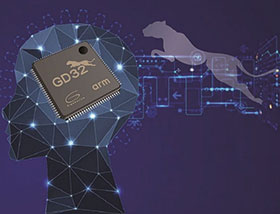

GigaDevice Semiconductor released the GD32E230 series of Arm Cortex-M23 based MCUs (microcontrollers), which support security extension requirements to run the latest embedded application solutions. The product family comprises 18 product types, including package options of LQFP48, LQFP32, QFN32, QFN28, TSSOP20 and QFN20 with a chip dimension from 7 x 7 mm to 3 x 3 mm.
As the first series of the GD32 MCU family based on the latest Cortex-M23 core, the GD32E230 series is manufactured using 55 nm low-power technology, focusing on ultra-low cost applications. With its small size and power efficiency, it can compete with traditional 8-bit and 16-bit product solutions while delivering improved performance and power efficiency over the Arm Cortex-M0/M0+.
Arm Cortex-M23 is the successor of the Cortex-M0 and Cortex-M0+, and is based on the latest Armv8-M architecture of embedded microprocessor cores. It adopts a Von Neumann two-stage pipelined structure and supports the complete Armv8-M reference instruction set while maximising code compactness. Moreover, it is compatible with all Armv6-M instructions, allowing engineers to easily transfer code from Cortex-M0/M0+ processors to the Cortex-M23.
Additionally, the new core is equipped with independent resources such as single-cycle hardware multipliers, hardware dividers, hardware frequency dividers, nested vectored interrupt controllers (NVICs), enhancing debug error correction and traceability for easier development. Subsequent products can also benefit from TrustZone technology designed to support trusted and non-trusted software isolation and protection in hardware, and to meet multiple security requirements.
GD32E230 series products have a system frequency of up to 72 MHz and are equipped with 16 KB to 64 KB of embedded Flash memory and 4 KB to 8 KB of SRAM. While running under the highest frequency, they can achieve a working performance of 55 DMIPS and their CoreMark test score can reach up to 154 points. Compared to the same frequency on similar Cortex-M0 and Cortex-M0+ products, the code execution efficiency of the Cortex-M23 is 40% higher and 30% higher, respectively.
The MCUs also provide flexible interfaces to enhance connectivity, with up to five 16-bit general-purpose timers, a 16-bit basic timer and a multi-channel controller, while the universal interface includes two USARTs, two SPIs, two I²Cs and an I²S. In addition, there is a 16-bit advanced timer that supports three-phase pulse width modulation PWM output and a Hall acquisition interface.
For signal conditioning, a high-speed, rail-to-rail input/output analog voltage comparator and a 12-bit, 2,6 MSPS sampling rate analog-to-digital converter (ADC) with multi-channel high-speed data acquisition support mixed-signal processing for motor control and industrial application requirements.
The GD32E230 is powered by a 1,8-3,6 V supply voltage and the I/O ports are 5 V tolerant. The maximum operating current is only 118 A/MHz with all peripherals enabled at full-speed operation mode. While in deep-sleep mode, the current is reduced by 86% and the standby current is only 0,7 A when the battery is used to power the real-time clock (RTC).
With its 6 kV ESD protection and electromagnetic compatibility (EMC) capabilities, it is suitable for industrial automation, motor control, LED display, household appliances and electronic toys, smart cities and smart homes, electronic payments, electric vehicles, drones, robots and other applications.
| Tel: | +27 11 728 4757 |
| Email: | [email protected] |
| www: | www.mbsiliconsystems.co.za |
| Articles: | More information and articles about MB Silicon Systems |

© Technews Publishing (Pty) Ltd | All Rights Reserved